Peter MALONE
Saturday, 18 September 2021 19:33
Dead Easy
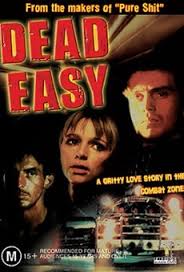
DEAD EASY
Australia, 1982, 85 minutes, Colour.
Scott Burgess, Tony Barry, Sandy Gore, Rosemary Paul, Tim McKenzie?, Max Phipps.
Directed by Bert Deling.
Dead Easy is a colourful gangster thriller set in Sydney’s Kings Cross. The film uses actual locations, night sequences to some effect. It is the work of Bert Deling, maverick Australian writer-director whose films include Dalmas (1973) and Pure S (1976). There is a good Australian cast led by Scott Burgess, Tony Barry, Sandy Gore and others lead the supporting cast. (The film had practically no commercial release when made, in 1982.)
1. Satisfying Australian thriller, city of Sydney?
2. Kings Cross settings, the use of Kings Cross and day and night, the glitz, the style, the ugliness? Authentic? Musical score, songs, choreography of the clubs?
3. The title and the presumption, dead?
4. The portrait of George: background, age, experience, the streets, self-image, behaviour, dress? Alex and infatuation? The clashes with her madam? Going to jail, behaviour in jail, young and inexperienced, bravado? The ups and downs of his career at the cross? The factions and the bosses, the violence, his involvement? His friends? Being given the job of starting the club, preparations, auditions? The bit-men and the set-ups? The violence, the eruption, the danger? The chase, survival, dead easy? Alex and her place in his life, in the dangers? The young policeman, his hounding George, getting him to prison, his being let out, sacked and his helping Alex and George in the expose?
5. Alex and her work at the Cross, talent, prostitution, her relationship with the madam? Encountering George? Prison? The clash, dangers? The audition, hopes? Ups and downs, performance? The final chase and dangers?
6. The madam, her hold over the girls, hold over Alex, lesbian? Involved?
7. The world of the gangsters, the hit-men, plans, killings, set-ups, the heavies, the role of the police, buying off the police, murders?
8. The brothers and their background, owning clubs, their legal advice, deals, fronts, the clubs, the opening, the killings?
9. The senior police, on c e take, connections, their conduct, safeguarding the gangsters, exposed?
10. The young policeman and his earnestness, tough, the letter of the law, the senior police, his anger, violence, the set-ups, tracking George, prison? His being ousted, drinking, the clubs, infatuation with Alex, the decision to help, the final confrontations?
11. Tony Barry as the thug, his connections, the clash with the brothers, deaths?
12. The world of sleazy people, situations, people destroying each other? Freedom? The hold of the modern city?
Published in Movie Reviews
Published in
Movie Reviews
Tagged under
Saturday, 18 September 2021 19:33
Dead Bang
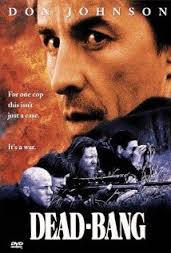
DEAD BANG
US, 1989, 101 minutes, Colour.
Don Johnson, Bob Balaban, William Forsythe, Penelope Ann Miller.
directed by John Frankenheimer.
Dead Bang is a type of police thriller directed with flair by John Frankenheimer (French Connection II). It is a star vehicle for Miami Vice's Don Johnson. He gives a better performance than might be expected.
While the film has the expected presentation of the police investigation, violence and tough confrontations, it also has its attack on the by-the-book F.B.I. investigators and their taking the credit for all missions. It also uncovers a contemporary theme of the late '80s, white supremacist groups and the raising of fascist and racist fears.
1. Interesting police thriller, the title and tone? The white supremacist theme?
2. Los Angeles locations, Arizona, Oklahoma, Colorado - and Canadian settings standing in for all these states, both open plain and Rockies? Musical score and atmosphere? Songs?
3. The film as a portrait of Jerry Beck: initially seedy, the court order restraining him from his children, going to the school and looking at his daughters, the phone call to his wife, Christmas and his anger, breaking the phone? Being called to the murder investigation, the murder of the
policeman? The Christmas party, the encounter with Linda, the night with her, finding her photo, debating with her, her motivation for being with him? The suspect, the computer investigations, ringing the parole supervisor, getting the file on Christmas Day, going to interview the bikies, the long chase, his vomiting? The contact from Arizona, his arrival, the police chief staking out his territory, the sudden shoot-up? Discovering the box with the letters? Going to Oklahoma, the encounter with Kressler and the sombre F.B.1. man? The complaints about his swearing? The cold and his overcoat? Going to the police sheriff and the notice about niggers? The racism and the F.B.I. arrival? Going to see the Reverend-Eberhardt? and his racist church? The talking with his boss, the order to go to the psychologist, the interview with the psychologist and his laughing at him because he looked like Woody Allen? The intensity of the interview? The spite of the psychologist? Going to Colorado, the local authorities and the black policeman going with him? The F.B.I. arrival? The mission, the search of the property, the entry, Beck's stubbornness, discovering the underground arsenal, the gang and the shoot-out, the irony that Bobby Burns was not the killer? The arrival of John, his madness, death? Jerry watching the F.B.1. take the credit? The effectiveness of Don Johnson in the central role?
4. Kressler and the F.B.I., prim, clean-cut, going by the book, objecting to Beck's language, in Colorado, giving information before it was needed, surrendering his gun, the clash with Beck, the credit at the press conference? The irony of the attack on the F.B.I?
5. The parole officer, Christmas, his anger, the file, the interviews with the bikies, following in the chase?
6. The bikies, background in jail, Bobby and his convictions, John and his studies, the racist symbols and attitudes, the murders, the massacre in the Arizona cafe, the ambush, the shoot-outs in Arizona? In the arsenal in Colorado? The truth about John and his relationship with his brother?
Violent madness?
7. The supremacists, the small groups around the country, the attitude of the F.B.1., the Arizona massacre, the Reverend Eberhardt and his Arian church, the letters, the meeting in Colorado, the arsenal? The F.B.I. decision to attack the white supremacist groups?
8. Effective action, chases, tough style, policemen doing their job?
Published in Movie Reviews
Published in
Movie Reviews
Tagged under
Saturday, 18 September 2021 19:33
Dead and Buried
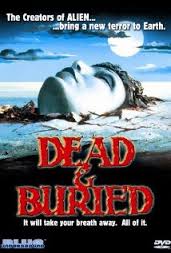
DEAD AND BURIED
US, 1981, 85 minutes, Colour.
James Farentino, Jack Albertson, Melody Anderson, Lisa Blount.
Directed by Gary Sherman.
Dead And Buried is a macabre horror thriller. It is both ghastly and fascinating. It was directed by Gary Sherman who made the arresting English horror thriller Death Ride with Donald Pleasence and Christopher Lee. This film offered a subterranean semi-human culture - descendants of workers left underground in the late 19th. century in London. The American setting of this film is very similar to that of The Stepford Wives or The Invasion of the Body Snatchers. The theme is also a variation on living dead and zombie films - the ordinary American town which is being transformed into controlled living dead. The cast is good, the special effects good and sometimes gruesome, the themes interestingly presented. A horror film for devotees of the genre.
1. Audience response to horror? Nightmares, fantasy, what if...? The ability to face nightmares? Shock, suspense, gruesome violence, terror, mystery?
2. The plausibility of the plot? The trappings of plausibility - the average American town e.g. in the credits and the establishing of the town? The gradual transformation of the ordinary town into an extraordinary and horrible town? The initial killings, the taking of photographs, Dobbs and his funeral parlour? The growing number of murders, the victims reappearing in mundane situations? The mystery of the investigation? Dan as police hero? The gradual build-up of horror? The shock ending? The implausibility of the ending ~ and throwing doubt on all that had preceded? Plausibility and atmosphere - especially while on the screen?
3. The background of voodoo and witchcraft and its being commented on in the film? The zombie legends? The living dead? The mythologies of past centuries updated? The technological 20th. century aspects for creating and preserving the living dead? Medicine, law, art? Human vanity and pride?
4. The strength of the basic horror idea - violent death, control of the heart, the reconstruction of the body, technological power, psychological power? The variation on the 'mad doctor' theme? The role of the zombies in the town - performing the usual functions of the average American citizen? The use of the horror devices and myths for an ironic comment on the quality of 20th. century American life?
5. The credits and the ordinary town? The photographer and his skills? The overtones of the sex film and the seduction? The sudden ugliness of the death and burning? The victim later found in the car alive? The murder of the fisherman? The family and their being chased and terrified in the house? The hitch-hiker and her murder? The irony of these people appearing alive again?
6. The picture of the killers - ordinary people, gloating over death, the ugly violence, the photography? Seeing them in their ordinary occupations and knowing they were killers? Seeing them in operation? Their all gathering at the end?
7. Dan and the ordinary policeman hero? His training, his home town? The humour with his secretary and her phone calls? His assistants? Investigating the murders - and the overtones of the police thriller? The discussions with Dobbs and the theories about death, embalming? The ordinariness of his home life? His gradual suspicions of his wife - and being proven wrong? (And the audience being taken in with him?) His following through the investigations, the telex about Dobbs. the digging up of the grave. the discovery of the hearts? The confrontation with Dobbs? The truth about his wife? The truth about himself? The strength of the character portrayal for being the central focus of the film?
8. His wife and her attractiveness, life at home, love for her husband? Her teaching and her comments about voodoo and witchcraft? Suspicions being allayed? The irony of seeing her in the film at the end? Her killing of her husband? The discovery that she was a zombie under Dobbs' control? The eeriness of this transformation?
9. Dobbs and his fussiness, his focus on his work, his explanations, the madness of his talk? His assistant? The hitch-hiker and his transforming her? His control? The truth about his past? His engineering his own death? His bringing himself back to life? His control even of Dan? The mad doctor?
10. The gallery of characters in the town - the photographer transformed to the service station assistant, the woman in the cafe, the doctor helping and his being transformed, the headmaster, the fisherman? The range of ordinary people and their appearing as living dead at the end?
11. The sinister aspects of American small town life?
12. Insight via the horror film and its conventions into evil, power, control?
Published in Movie Reviews
Published in
Movie Reviews
Tagged under
Saturday, 18 September 2021 19:33
D.C. Cab
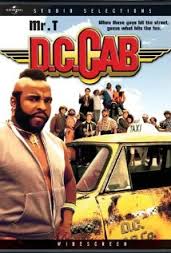
D. C. CAB
US, 1983, 99 minutes, Colour.
Max Gail, Adam Baldwin, Mr T, Gary Busey, Irene Cara.
Directed by Joel Schumacher.
D.C. Cab is a very raucous comedy - a bit too raucous for non American tastes. It shows a group of almost has-beens working for a taxi service in the American capital - and failing by comparison with more enterprising groups. The company is the usual gallery of misfits and oddballs, American style. This group eventually gets together, challenged by a young man with vision (played by Adam Baldwin of My Bodyguard) and things get going really well. However, it is all complicated by two precocious children of an ambassador being kidnapped with the hero - and it's the taxis to the rescue. There is a great deal of literal knockabout comedy and a look at the sidelights of the American capital (emphasising its predominantly black population).
The film was written and directed by writer-director Joel Schumacher (The Competition, The Incredible Shrinking Woman). He presents a lot of situation comedy television style, farcical situations, verbal humour. The cast ranges from a loud Gary Busey to a peculiar (less violent than in Rocky and the A-Team) Mr. T. There are African Americans, Spanish-speaking Americans, a great range of misfits. They are presented fairly sympathetically and the moral of this '80s story is that people who used to be anti-heroes and heroines or outcasts and misfits can make something of themselves and be successful Americans. It is all in the post-Rocky vein. There are quite a number of amusing visual and verbal gags - but it is of limited appeal. It's the kind of feature that is seen by executives as a possible pilot for a subsequent television series.
Published in Movie Reviews
Published in
Movie Reviews
Tagged under
Saturday, 18 September 2021 19:33
Day the Earth Stood Still, The/ 1951
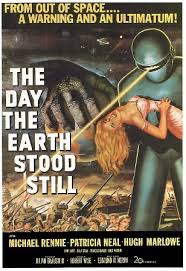
THE DAY THE EARTH STOOD STILL
US, 1951, 92 minutes, Black and White.
Michael Rennie, Patricia Neal, Hugh Marlowe, Sam Jaffe.
Directed by Robert Wise.
The Day the Earth Stood Still came early in the popularity of science fiction films. While it shows someone coming from another planet and people's fears, it shows a sympathetic 'alien' instead of a terrifying monster. Michael Rennie invests Klaatu with great dignity and wisdom. This makes the film not only science-fiction adventure but a moral fable as well. The film was directed by Robert Wise when he made several films for Fox each year, long before the days of West Side Story and The Sound of Music.
1. Although this film was made in 1950 and with the styles of those times, critics say it is good science-fiction for our times. Do you agree? Why?
2. How far-fetched were the basic ideas of the plot? How possible that advanced life exists on other planets? How plausible did the film make its plot - e.g. the Washington setting?
3. How would you expect people to react if a spaceship landed amongst them? How strong would their fears be?
4. How typical was the American reaction of shooting impulsively?
5. What kind of person was Klaatu? How attractive a man? How did the film make him a hero?
6. Why had he come to earth? How important his message?
7. The core of the film was the contrast of earth behaviour with Klaatu's behaviour, of showing up our own squabbles, hatreds, fears, suspicions by contrasting these with Klaatu's. How was this done effectively - e.g. the radio and T.V. bulletins, Klaatu's discussions with government representatives, the telegrams for his proposed summit conference, the gossip created about him?
8. How important for the message of the film was Klaatu's living in the boarding house and his learning of earth from ordinary people?
9. What did Klaatu’s friendship and outings with the family contribute to the film - and its message?
10. What kind of woman was the heroine? Her sympathy? Her trust of Klaatu?
11. Her fiancee? His ambition to be a hero overcoming his love for her? was this credibly shown?
12. The encounter with the Professor? How important? The proposed conference?
13. The chase - was it excitingly filmed? Klaatu's death. What were your reactions? Why?
14. Were you glad of Klaatu's revival and escape?
15. What impact does this kind of film have? Is the lesson timely and valuable? The value of Klaatu's personality and behaviour as a model?
Published in Movie Reviews
Published in
Movie Reviews
Tagged under
Saturday, 18 September 2021 19:33
Day the Bubble Burst, The
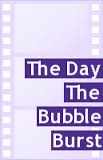
THE DAY THE BUBBLE BURST
US, 1981, 142 minutes, Colour.
Richard Crenna, Robert Vaughan, Robert Hays, Frank Converse, Blanche Baker, Audra Lindley, Bill Macy, David Ogden Stiers.
Directed by Joseph Hardy.
The Day the Bubble Burst is a look at the crash of Wall Street in 1929. it is based on a best-seller, has the technique of focusing on a number of stories and blending them together so that audiences can understand tile repercussions of the crash. The film is designed as telemovie, for the widest possible audience - and, at the end, has an endorsement that the film is useful for historical study for students.
The film was directed by Joseph Hardy, a director of many telemovies including Great Expectations with Michael York and James Mason. There is a solid cast including Richard Crenna, Robert Vaughan, David Ogden Stiers. There are a lot of excellent character actors who fill out the background of America in the '20s. (An interesting comparison would be Oliver Stone's 1987 look at the Stock Exchange in the '80s, Wall Street.)
1. Audience interest in the 1929 crash? Americana? A re-creation of history? Situations, characters, the build-tip to the crash and its consequences?
2. The film as a telemovie, its scope, period, range of stories and characters? The atmosphere of the time? Re-creation of period? Musical score?
3. The structure and the stories: the human element in the build-up to the crash, ordinary people and their investments, greedy people at all levels trying to exploit the market? The significance of the Jazz Age chorus? The build-up to the day the bubble burst? The information given at the end about the various characters and the consequences of the crash? (The evil being punished, the good surviving?)
4. The stories commenting on each other, American society, capitalism, the various theories for the crash?
5. The Michigan story: audiences identifying with the situations and characters? The bank, the staff decision about the money, the embezzlement and the risks, the information coming in from New York, the tensions amongst the various members of the staff? Leroy and his nervousness, the build-up to the confrontation, his telling the truth to the bank owner? The owner and his sense of integrity? His son emerging as
one of the embezzlers? The reputation of the bank, the investments, the closing of the bank and the staff reaction? The population?
6. The Michigan story of Jolan and her parents, their needs, the bequest of $400, Mr Goldenberger and his matchmaking, Barker and the postman, the unions, tile discussion about capitalism and socialism, mediation? Steve, the courting of Jolan, the interviews about his prospects? The wedding, the money, anxiety? The parents and their losses? The aftermath and the comment about Jolan and Steve and their life?
7. Jesse Livermore and his ruthlessness, a market bear, his office and his staff, his womanising, his wife and her alcoholism, their clashes and fights, his sense of the market move, his reliance on instinct and timing, the professor and the interviews to bear up his interpretation, relationship with the journalists, his success? The aftermath and his downfall?
8. The contrast with Durant and his being a market bull, his friends, their success, deals, callous attitudes, their professor to back up their opinions, failure?
9. Richard Whitney and his presence on the Stock Exchange, his extensive speculations, reliance on George and J. P. Morgan's for support, the crisis at the Exchange, his being in charge, J. P. Morgan and the rescue, the decision not to rescue the Exchange? The decision to close the gallery? His failure? The subsequent information about his career and its failure?
10. Gregory and the Jazz Age, his father, socialist background, in love with Frances, nights out, marrying her, their life-style, Frances' family and their Wasp background? At work, J. P. Morgan's, encounters with Whitney, his discussions with Frances about the Exchange, conscience? Their becoming New York socialites?
11. The Blacks: the father and his speculations, the mother and her ignorance, Gloria and her life-style, collecting information, the play? Her visit to Germany and being on the set of The Blue Angel? The comments about Marlene Dietrich and the Nazis, about Emile Jannings, the singing of 'Falling in Love Again'? The plight of the Jews, her return? The collapse of the market and their lifestyle? The father's despair, the struggle with her father to stop him killing himself?
12. The jazz, the chorus, its being inserted throughout the film? Symbol of the period?
13. The consequences of the build-up to the Stock Exchange? The effect on the American economy in the '30s?
14. Themes of capitalism, American money, the law, manipulation, greed and control?
Published in Movie Reviews
Published in
Movie Reviews
Tagged under
Saturday, 18 September 2021 19:33
Days of Wine and Roses

DAYS OF WINE AND ROSES
US, 1962, 116 minutes, Black and white.
Jack Lemmon, Lee Remick, Charles Bickford, Jack Klugman, Alan Hewitt, Tom Palmer.
Directed by Blake Edwards.
Days of Wine and Roses is an enigmatic title for a film about alcoholics. The tone is nostalgic. In 1945 Ray Milland won the Oscar for his performance as an alcoholic in Billy Wilder's "The Lost Weekend". This was considered a Hollywood breakthrough in the treatment of serious themes. Since then many films about alcoholics have been made. This is one of the most striking, especially as it has Jack Lemmon and Lee Remick (both nominated for Oscars) in the roles of the alcoholics. The film is very sombre, and does not offer very much hope at all. The interaction of husband and wife trying to help one another and then bringing one another down is full of pathos. Filmed in sombre black and white, it was directed by Blake Edwards who is perhaps best known for his comedies, especially the Pink Panther series. Most audiences who want to see a good serious film about drink and alcoholics would profit by this one.
1. What was the total impact of this film? How strong? How salutary? Or was it merely a moral tract: the meaning of the title from the poem? Did the theme song add anything to the film or detract from it? The use of the music throughout the film? The starkness of the black and white photography?
2. How well did the film present its moods? How did it change from mood to mood?
3. How successful was the presentation of the rat-race? How distasteful a life that Joe Clay was leading? As a picture of typical modern society? What criticism were implicit in this presentation of society? The parties etc.? Kirsten's presence?
4. Why did Joe resort to alcohol? What effect did it have on him? How did it lull his conscience? What bad effects did it have on him? How did it succeed in deceiving him about its effects?
5. Did the film moralise at any time? Did it change from presentation to moralising at any time? If it moralised, how effective was it? How appropriate?
6. Joe Clay - symbolism of the name - How successful as a P.R.man? Was he merely the equivalent of a pimp? Was it natural that he wanted to forget this kind of job? What attracted him to Kirsten after his misjudgement of her? Why did they fall in love? Did they marry too precipitately? Why did he so insist on her sharing his drinking habits? What change did their child have on them? Why did Kirsten beg him to drink? Why did he go downhill after his marriage? with his jobs? Why couldn't he handle them? How good a man was he? How average a man? How typical of the ordinary drinker?
7. How attractive was Kirsten at first? She was presented as a lady. In her romance with Joe? As a mother? Why did she begin to drink with him? How much of an effort was it for her? Why did she begin to go downhill? Why did she become unreliable? Why did she rely more and more on drink and not do anything else? And yet she remained the mother all the time.
8. What impression did the binges have on the audience? What effect did they have on Joe and Kirsten? How dramatic was this? How well filmed were the binges?
9. Was Kirsten's father a good man? Was he too severe? In her upbringing? In his memory of her mother? In the regrets about his life? Were you glad when he offered Joe and Kirsten a home? Did you hope that they would succeed?
10. How disappointing was the farcical evening they had drinking together in the bedroom? With the father then intervening? And the contrast when Joe destroyed the glasshouse? How important was this destruction sequence? How convincing was it? Why?
11. The impact of Joe in the straight-jacket? In the style in which it was filmed? How horrifying? How realistic?
12. Was the appearance of Jim and Alcoholics Anonymous presented credibly? was it an adequate picture of Alcoholics Anonymous and its work? What was you reaction to Jim and to the Association? To Joe's going to the meeting? To Jim’s presentation of Jim and to Joe's presentation of himself?
13. Could you understand Kirsten's pride in not going to Alcoholics Anonymous? In her not admitting her problem to herself?
Published in Movie Reviews
Published in
Movie Reviews
Tagged under
Saturday, 18 September 2021 19:33
Days of Heaven
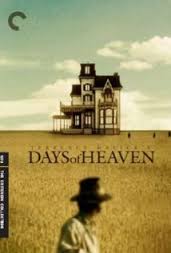
DAYS OF HEAVEN
US, 1979, 93 minutes, Colour.
Richard Gere, Brooke Adams, Sam Shepard, Linda Manz.
Directed by Terrence Mallick.
Days of Heaven is an impressive film by Terrence Mallick (his Badlands also portrayed a misfit couple, guilty of violence and society's victims in beautiful/harsh landscapes). Photography by Nestor Almendros is extraordinary and
exquisite, especially of seasons, wheat lands, locusts and fire. Period is 1916, the verge of the modern era, especially for the migrants, the poor and the wandering unemployed. Work sequences in factory and on farm are compelling. The personal drama (lyrical and stark) is Eugene O'Neill-type fate-ridden tragedy - of passion, errors, betrayal and death - all told by Linda Manz as a striking girl-woman who draws our attention to her viewpoint on these particularly American happenings. Ennio Morricone's plaintive score is a bonus.
1. The significance and tone of the title? Heaven and Earth meeting on the wheat fields? The days of the gods and the myths of time past and the comparisons with human beings in the present? Indication of thews, irony?
2. The visual impact of the film and the quality of the photography, the composition of sequences? The cityscapes of coal heaps and factories, the movement across the countryside in trains and on horses, on boats? The countryside and the wheat fields, the animals, the seasons? Interiors and exteriors and exteriors especially of the Gothic house? Plague of locusts, fire? The moods of the landscapes, of the weather?
3. The contribution of the musical score and its rousing themes, plaintive thews?
4. The value of the film as a piece of Americana? Its insight into the united States at the beginning of the 20th. century? The end of an era, the focus on World War One? The apocalyptic overtones of comments about the changing of the times, destiny, plagues and fire? The migrants and their European background, adaptation to America, lack of opportunities? The poverty and squalor and labour of the cities? The hardship and hopes of the migrants going to the wheat fields which seemed so promising with harvest? The hardships of labour, survival? The transition from manual work to machines? The threat to the animal herds? The contrast with opportunities of wealth, leisure? Opportunity, lies, passion? World War One?
5. The American themes and traditions from drama of poverty and wealth, passion, lies, fraud, guilt and innocence, violence?
6. The device of having Linda speak the narrative? Her tone, accent, choice of words, viewpoint and observations? The commentary on characters and motivations, on the events? How well did they compare with the audience's view of characters and events? The contrast? The pathos of her age, experience, hopes, hard work? The girl-woman? The particularly American commentary that she gave? The moral and emotional judgment on what happened? Her own actions within the story and her relationships to the key characters?
7. The structure of the film in three sections: the prologue of the credits and the collage of poverty and suffering and the industry in the American cities, the hard work of the women for survival, the furnaces and the clashes; the work of the group going out to the farms? The second phase of the marriage and the response to wealth and leisure? Thirdly, the outcome of the lies, the dynamics of the marriage and the potential for tragedy, plague and fire, death and vengeance? The epilogue with Abby going off with the soldiers and Linda going down the rail track?
8. The portrait of individuals and the complexity of their lives? Their hopes for themselves no matter what their lack of opportunity, dreams of achievement? Hopes, passions? The possibility of freedom? Mistakes? Greed? The inexorability and irrevocability of fate?
9. The importance of the credit photos and the prologue and the comment on life in Chicago? The furnaces and the noise, the hard way of life and the treadmill of feeding the furnaces? Billy within this context, fighting and leaving? Abby and her dependence on Bill? Linda and her bond with her brother? Their decision to stay together and accept their fate together - and the irony of this decision? The plan to go as family for self-protection?
10. The picture of the trains (Noah's Ark suggested) - the people and their hopes, the crowds? The wheat fields and the animals and the peace and prosperity offering? Their entering into the farm via the strange gate? The vision of the Gothic house - unattainable for the workers? The irony of its being attained by the three? The sequences of fellowship in work, play, the swimming, the talking? The experience of the oppressed? Seeing them as victim of hard work, of the seasons in the snow? Their achievement? Being penalised for lacks in work? The way of life on the wheat belt? President Wilson's visit? The animals, the machines? A portrait of labour?
11. Billy and the family within this context? The screenplay's not delineating them clearly until the second part of the film? Their managing? The importance of their posing as family and people's suspicion and comments? The bond between Billy and Abby? Linda and her friends and their discussion of hopes for the future? The prospect of having to move on after the harvest?
12. The farmer and his character? Age, living in the old house, his supervisory work, his relationship with his manager and dependence on him? The illness and the year to life? His looking at the group, his continual focus on Abby and her attractiveness to him? Falling in love with her, his hopes for his final year?
13. The image of the house, exteriors and interiors? Seen in long shot and its strangeness on the fields? The significance of the house for the farmer, for the three? The house. ultimately being brought down?
14. The possibility for fraud and greed? Billy and his pushing Abby towards the marriage? Abby's reluctant decision? The wedding sequence and the ambiguity of its joys? The celebration and happiness? Abby and her love for the farmer? The scenes of their happiness together, intimacy? A transformation in love for both? The audience's attitude towards the sham marriage and the changing attitudes of each? Billy and his being ousted from this situation? The lyrical scenes of sharing, their enjoying refinement and leisure? The recreations and Linda’s enjoyment? Her work in the kitchen? The outdoor sequences - and the glass under the water as indication of infidelity?
15. Linda and her way of life, her observations on what was happening during this period? Emotional and moral comment?
16. Abby and her change, her music and dancing, clothes, growing tenderness?
17. Billy and his passion, the night out with Abby, their drinking together and the glass in the water? Their trying to cover their tracks?
18. The importance of the manager and his understanding what was happening? His being put out by the farmer? His threat to Abby and Billy? The vengeance at the end?
19. The intrusion of the planes and the oddity of the echoes of World War One and the Red Baron on the wheat fields? The humour of the group, their performances and the delight in the concert? Billy's decision to leave with them and flying off?
20. Billy and his feeling of guilt? The night with Abby? The farmer's suspicions? The possibility of Billy shooting the farmer when out hunting and his inability to do this? The irony of his accidental killing of the farmer? How guilty was Billy of what was to come? How much did he deserve the vengeance?
21. Billy's return and the coming of the locusts? The film's detail in presenting the locust plague? The fire fighting the locusts and the farmer's going berserk, the havoc in the fields? The spectacular aspects of the fire? The biblical overtones of plague and apocalypse? The confrontation of Billy and the farmer within this context? The irony of the accidental death?
22. The importance of their decision to escape, the frantic aspects of their leaving? Their isolation and loneliness? The bargaining for the boat? The seeming safety of going down the river? The people that they passed and their ordinary way of life compared with the desperate group? The seeming arrival in safety?
23. The overseer and the posse and the vengeance in the pursuit? The basic American theme of the West and the justice posse?
24. The desperation of the chase, Abby and Linda and their helplessness and grief, Billy and his desperate running and his dying in the water? The ultimate culmination of a tragedy of fate?
25. Abby and the love for Linda, leaving her alone, facing the future with the soldiers?
26. The contrast with Linda in the orphanage, her friendship with the girl and their escape - with all the girls watching? The disappointment of the girl as indication of the fears and uncertainties of the future? Linda and her sympathy and explanation that this was a close friend? A final caption on the openness of the future as they went down the track?
27. A satisfying drama, the visual impact of the film, its relationship to themes and issues as well as situations and character?
Published in Movie Reviews
Published in
Movie Reviews
Tagged under
Saturday, 18 September 2021 19:33
Days of Glory
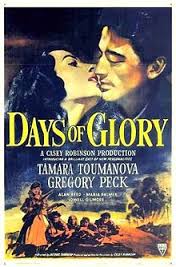
DAYS OF GLORY
US, 1944, 85 minutes, Black and white.
Gregory Peck, Tamara Toumanouva, Alan Reed, Lowell Gilmore.
Directed by Jacques Tourneur.
Days of Glory is a small-budget propaganda war film of 1943. Along with such films as Mission to Moscow and The North Star, it focuses on the Russians and their involvement in World War II. It is evident that the Soviet Union was a strong American ally at this time.
The film shows a group of partisans, their way of life, the struggles during the war, action involvement. The film has voice-over commentary highlighting the importance of the war effort - seeming somewhat dated today, but interesting in the light of the atmosphere of the times. The film, in a modest way, re-creates the atmosphere of Russia in the 1940s. The strength of the film, apart from the action sequences, is in
the humanity of the characters portrayed, their interactions, tensions, details of their way of life. The film also enhances the reputation of its cast by introducing them by comment and visually at the opening of the film, stressing the new talent. The commentary was right as regards the star - it was Gregory Peck's first film. He went on to make The Keys of the Kingdom, Valley of Decision and Spellbound, and a whole string of excellent performances in the upright American style. This culminated in his Oscar for To Kill a Mockingbird in 1962. Russian ballerina Tamara Tumanova has a supporting role as has director (Morning Glory) Lowell Gilmore.
The film raises the usual questions about war, humanity, heroism, life and death - all in the context of the attack of Nazi Germany and Russia's defence of itself.
Published in Movie Reviews
Published in
Movie Reviews
Tagged under
Saturday, 18 September 2021 19:33
Day of Triumph
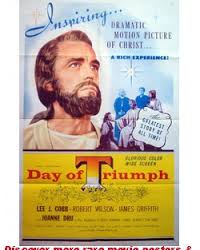
DAY OF TRIUMPH
US, 1954, 110 minutes, Colour.
Robert Wilson, Ralph Freud, Lee J. Cobb, Joanne Dru.
Directed by Irving Pichel.
Day of Triumph is an offbeat biblical film of the early '50s. The tradition for presenting Jesus on film was that of the popular art of the 19th century. This tended to be sentimental and romantic - even kitsch. The early silent films tended to perpetuate this treatment of Jesus and lead audiences to expect it. With the '30s, there was a greater reticence in the presentation visually of the person of Jesus. While Cecil B. de Mille had used H. B. Warner for King of Kings in 1927, in subsequent films Jesus was merely glimpsed or his presence suggested (e.g. The Robe from the same year as Day of Triumph). It was only in the '60s with King of Kings, The Greatest Story Ever Told and The Gospel According to Matthew that Jesus was once again presented. The most cinematically acceptable actor portraying Jesus was Robert Powell in Zeffirelli's Jesus of Nazareth. Here Robert Wilson portrays Jesus fully - quite well at the beginning with a certain strength and ruggedness. As the film moves towards the Passion and Resurrection he becomes more stolid and stilted (perhaps considered by the producers 'holy').
As with Jesus Christ Superstar, Jesus does not appear centrally but the emphasis is on Judas. With the background of the Zealot movement in Palestine at the time of Jesus, Judas is presented as a Zealot and his betrayal of Jesus a device to trigger off a Zealot revolution. This is certainly an interesting interpretation of Judas - who is presented
generally sympathetically.
The film was co-directed by Hollywood actor-director Irving Pichel, music composed by Daniele Amfitrioff and the film features Lee J. Cobb as Zadok. Joanne Dru as Mary Magdalene and Lowell Gilmore as Pontius Pilate. A blend of the expected celestial chorus piety with some vigorous sequences of Jesus and of the times of the origin of the New Testament.
1. The impact of this film within the tradition of films about Christ? Audience expectation of biblical spectaculars? The biblical images and iconography of the 19th. century - sentiment, romance? Humanity of Jesus, divinity? The silent tradition? The holy tableaux, the celestial choirs and music? The Cecil B. de Mille tradition? Action, the suggestions of the presence of Christ? Did this film fit into the tradition? Differences?
2. Production values? As propaganda for religious groups? The Hollywood contribution? Colour photography, atmosphere, recreation of the period and place? The musical score? The contribution of the Hollywood stars?
3. For what audience was the film made? Americans? Christians? Why? As a picture of Christ, as human, as divine, his mission of salvation? Impact, achievement, death? Christianity and its origins? A blend of the entertaining and edifying?
4. The dramatic interest of the Zealot framework? The invention for the Zealot story and situating biblical characters? The introductory information? The presence of the Romans, the initial chase? The flashbacks to the story of Jesus from the perspective of the Zealot storytellers? Zadok's point of view, Andrew's? The intermingling of material from the New Testament with fiction? The importance of the political tone? The selection of characters and events from the gospels as related to the Zealot movement? The focus on Judas and Barabbas? Jesus perceived in the context of the Zealot revolution?
5. The portrait of Jesus: the actor portraying him and visualised (in contrast with so many other films of the '50s)? Strength? Emotional? His manner, presence? His dress? The relationship to statuary, holy cards? The vigour of the early Jesus, the strength of his telling of parables and reciting of familiar material? His growing more solemn during the Passion and Resurrection sequences? How credible a Jesus? How edifying? The selection of Gospel events: calling of the apostles to be fishers of men, the disciples following him, the choice of the twelve, healing stories, the recitation of the Beatitudes, the treasure in the field, parables, the encounter with Mary Magdalene, the woman who was the sinner in the city at Simon's banquet, the visit to Martha and Mary and Martha's fussiness, the learning of the Our Father, the raising of Lazarus from the dead?
6. The proportion of the film of the Passion and the Resurrection: the entry into Jerusalem on the donkey, the greeting of the crowds, Jesus weeping over Jerusalem, the reactions of Annas and Caiaphas, the cleansing of the temple? The focus on the Last Supper, the dismissal of Judas and his being identified as the traitor, the Eucharist? The agony in the garden and the sleeping disciples? The encounters with Annas and Caiaphas, the long sequence with Pontius Pilate? Jesus as suffering - 'Behold the man'? The transition to Calvary, the criticisms of the thieves? Jesus' thirst, his death - and the accompanying storm? The atmosphere of the Resurrection and Jesus' appearances?
7. The use of Scripture texts for edification, adding contemporary dialogue to familiar biblical phrases? The creativity in the screenplay as differing from a mere fundamentalistic interpretation? The fictional narrative and audiences supplying their own knowledge? Jesus as a Gospel figure - and as a potential Zealot?
8. The Zealot group: Zadok as leader, Judas as an important man in the movement, his contacts, hopes, plans? The decision of John the Baptist and seeing him at the Jordan and his arrest? His wanting Jesus as leader? Zadok's plans and his not wanting to see Jesus? The possibilities for Jesus' role - long term and short term? The response to the entry into Jerusalem and the arrest? Zadok not wanting to act? His final speech about the significance of Jesus?
9. The sketch of the apostles - very subdued compared with other biblical films? Andrew and his Zealot contacts, the choice of the twelve, a few scenes with Simon? John and the others not being significant?
10. The focus on Judas as central? Shrewd Zealot, his ability to analyse situations, a sympathetic character? The failure of the Baptist and the hopes with Jesus? Interpreting his words, seeing the effect on the crowds, the miracles? The irony of his being chosen - unsuspecting? His being trusted with the purse? Contacts, using Jesus? His power, becoming more fanatical? Wanting action? The exhilaration of the entry into Jerusalem and then his depression? The plan for the arrest, the going to Caiaphas, taking the money? Everything going wrong and Zadok not moving? His giving the money back - and the failure of his mission and therefore his hanging himself?
11. The focus on Mary Magdalene, her watching Jesus, her wealth, the suggestions about her profession, her maid and the discussions about wealth? Her taking the ointment and anointing Jesus' feet? Jesus rebuking Simon (who was a plant by the High Priest)? The parable of love and concern? The Magdalene being touched, repenting, present at the raising of Lazarus, at the Crucifixion?
12. The sketch of Annas and Caiaphas and their pro-Roman stances, having spies, deals, pressure on Pilate, rousing the crowds to ask for Barabbas?
13. The portrait of Pontius Pilate, the Roman governor, his suspicions of the Jews. his meal and his wife. not wanting to fall into the tricks of Caiaphas? With the Jews? Trying to release Jesus instead of Barabbas? The discussions with Jesus (and the texts from John's Gospel)? The torture, Jesus' suffering, his washing his hands?
14. The final impact of the visuals - moving more towards accustomed holy card style and 19th. century spirituality?
15. The title and its reference to the Zealots and their hopes, to the triumph of Jesus transcending the expectations?
Published in Movie Reviews
Published in
Movie Reviews
Tagged under